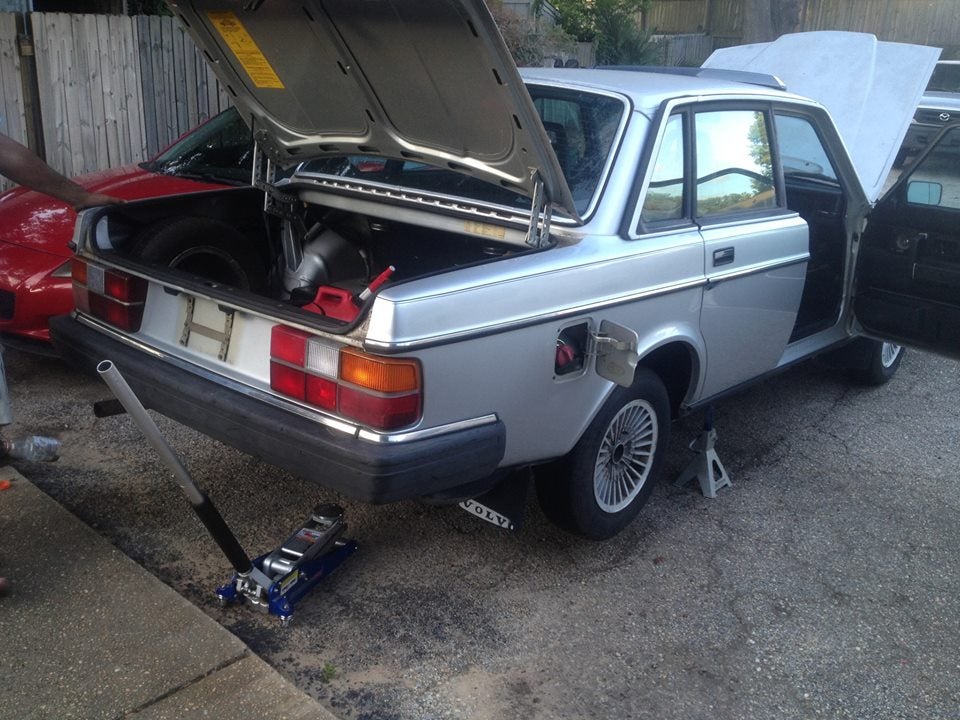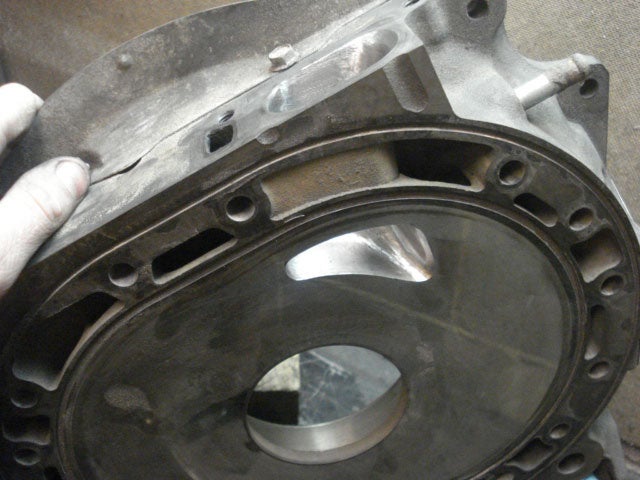 "roflcopter" (roflroflroflcopter)
"roflcopter" (roflroflroflcopter)
08/21/2013 at 22:57 • Filed to: lolvo
 0
0
 17
17
 "roflcopter" (roflroflroflcopter)
"roflcopter" (roflroflroflcopter)
08/21/2013 at 22:57 • Filed to: lolvo |  0 0
|  17 17 |

After a few long months of slowly reworking my super-cheap, craigslist find I finally get it buttoned up yesterday and decide it's time to go acquire the needed fluids for seeing if the hardwork paid off. Thus leading to issue number 1. Hop in the 'reliable' car, a 2004 RX8 I've been daily driving for around 2 years at this point, and as luck would have it, the car won't go into gear. It doesn't seem to be disengaging the clutch. Get my friend to check to see if the clutch fork is moving and it is, so chalk that one up to either the pressure plate or release bearing and move on to finishing the Volvo project. Might as well have one car working instead of none.
Fast forward to today. The Volvo is on the ground, I've finally figured out why the lights decided to stop working, the tires have air in them again, and it's time for it's maiden voyage while I'm trying to figure out the best place to order RX8 clutch components from. It drives great, except for the suspension issues it was having, the brakes dragging a lot, and the leaking transmission fluid(all of these are on the list, just slightly below the 'getting it running' checkbox).
Once across town where I'm meeting up with someone I decide to check out what the chirp/rattle coming from under the hood was. My friend touches the timing belt cover, where the noise seemed to be coming from, and instantly the car dies. Not dies out, not starts missing, just stops. Upon further inspection, it appears part of the 28 year old timing belt cover cracked off and fell down into the lower timing belt cover, got run through a pulley, and caused it to skip a few teeth.
Looks like I know what I'm doing after work tomorrow.
 Milky
> roflcopter
Milky
> roflcopter
08/21/2013 at 23:06 |
|
Damn that sucks .... love both your cars btw, get them back on the road soon!
 JasonStern911
> roflcopter
JasonStern911
> roflcopter
08/21/2013 at 23:10 |
|
Hop in the 'reliable' car, a 2004 RX8

Seriously, though, **** those cars - especially 2004's.
 roflcopter
> Milky
roflcopter
> Milky
08/21/2013 at 23:11 |
|
Thanks, the Volvo should be running again tomorrow evening as long as there isn't anything else wrong with it that I'm missing. The RX8 is on hold until I decide what to do about it... Either order a release bearing, throw that and the used clutch/pressure plate I have in it for the time being and see how long that lasts, or wait a paycheck and order a full clutch kit. Decisions, decisions...
 roflcopter
> JasonStern911
roflcopter
> JasonStern911
08/21/2013 at 23:15 |
|
This is precisely why I bought the Volvo. Once the kinks are worked out with it at least.
To be fair though, I have had almost zero significant issues with my RX8. Better compression than when I bought it on the original motor.
 JasonStern911
> roflcopter
JasonStern911
> roflcopter
08/21/2013 at 23:19 |
|
Better compression than when I bought it on the original motor.
!!! UNKNOWN CONTENT TYPE !!!
It's a 2004! Unless it's a track car or has like 300k+ plus on it, it should still be on the original motor.
Your Volvo sounds awesome, though. Best of luck with your repairs on that.
 roflcopter
> JasonStern911
roflcopter
> JasonStern911
08/21/2013 at 23:21 |
|
If you knew how many people with the early years were on their second, third, sixth engine it'd make more sense. You either got a winner or a loser back in those days, and the remans are even worse.
 roflcopter
> roflcopter
roflcopter
> roflcopter
08/21/2013 at 23:24 |
|
Also, 2004 is the only year they made it in yellow ;)
 MR2_FTW - Group J's resident Stig
> roflcopter
MR2_FTW - Group J's resident Stig
> roflcopter
08/21/2013 at 23:28 |
|
Sounds like a friend of mine. He's been through like 12 cars in the 5 or so years I've known him and the one reliable car he's had through all of it is an FC RX7. Weird, right?
 JasonStern911
> roflcopter
JasonStern911
> roflcopter
08/21/2013 at 23:30 |
|
It was the damnedest thing with my 2004. For the first roughly four years, 40k miles, the thing was rock solid other than the sun visor cracking. Then everything just completely fell apart. The check engine light came on, causing the dealership to replace the ECU. Then the motor went out, at which point the coil packs and motor mounts also had to be replaced. Then both the transmission and the torque converter went out. Partially my fault for owning an auto-tragic in the first place, but the fluids were fairly fresh and topped off, and how in the hell does a torque converter break on a motor making 17ft.lbs or torque? Finally, the starter went out leaving me stranded in a snow storm, and that was the last straw. Bash the remanufactured motors all you want, but they ran long enough for me to trade the car in. :)
 roflcopter
> MR2_FTW - Group J's resident Stig
roflcopter
> MR2_FTW - Group J's resident Stig
08/21/2013 at 23:34 |
|
Treat them right and they treat you right.
As long as it's not a Turbo II
 roflcopter
> JasonStern911
roflcopter
> JasonStern911
08/21/2013 at 23:35 |
|
The automatic thing almost certainly had a role in the engine going(starter and other stuff is just bad luck). These engines weren't meant to be shifted early or put on the back burner.
 Milky
> roflcopter
Milky
> roflcopter
08/21/2013 at 23:44 |
|
Well have fun debating that :/ ..... I'll have you know though I almost bought an RX-8 based off this one video.
.... dat mid pipe delete doe.
Test drove one and it felt phenomenal, but reliability issues scared me away for the time being. I will own a rotary some day though (when in a better financial situation)!
 a cat named scruffy- live from Caldor
> JasonStern911
a cat named scruffy- live from Caldor
> JasonStern911
08/22/2013 at 00:00 |
|
That laughter is just like my mechanic did when I told him I was thinking about buying one of those.
 JasonStern911
> roflcopter
JasonStern911
> roflcopter
08/22/2013 at 22:56 |
|
Maybe, but I'm convinced the Renesis' failing points are two fold:
1. Improper lubrication. When Mazda revised the RX-8, they added additional oil injectors. They wouldn't do that unless there was evidence that parts of the apex seal were not getting properly lubricated. One could put two stroke oil into their gasoline when filling up to help resolve this, but that would affect emissions so there is no way that Mazda could recommend doing this...
2. Increased heat due to emission requirements. The addition of catalytic converters close to the exhaust manifolds as well as increased exhaust gas recirculation in order to have the motor burn more cleanly lead to an increase in the operating temperatures in a motor that already ran hot due to its compact size and multiple combustion cycles per revolution. Remember, the Renesis went from a peripheral port to a side port design, and that lack of overlap certainly seems like it would also increase the operating temperature. And excessive heat could directly affect the lubrication, which in turn could wear the apex seal prematurely.
When I was growing up, the neighbor had an automatic FC3S convertible with 120k miles on the original motor and it still ran fine and passed emissions. I know that is not a lot of miles, but it is at least 3x as many as the motor in my car lasted and at least 50k more than my girl's motor lasted. It seems weird that the naturally aspirated motors were more reliable 20 years before the Renesis, in both automatic and manual forms.
That said, the automatic equipped Renesis motors were a four port motor versus a six port, so there may be some reliability gains from the better breathing which in turn could help dissipate heat from the engine. But the "don't lug a rotary or it will blow up" idea tends to stem more from carbon buildup, and the dealership did their carbon cleaning on my motor prior towards its failure. And I certainly didn't granny my motor, which might partially explain the transmission having problems. But given the complete failure of the apex seal, I'm more inclined to believe lubrication was the culprit, despite running only dino oil and keeping it properly topped off.
 roflcopter
> JasonStern911
roflcopter
> JasonStern911
08/22/2013 at 23:59 |
|
I agree with your points, but I disagree with your reasoning on why they occur.
The improper lubrication is the death toll of many of these engines and the emissions requirements only make it worse. The early cars had certain things done to them from the factory due to meeting changing EPA standards at the time of the car launch and the ones that got driven hard early in their life(before Mazda tried to remedy the issue in a better way) seemed to be the ones that popped their top early.
Part of Mazda's campaign to make these meet emission regulations was the requirement of thinner oil, which breaks down even quicker at the higher temperatures of a rotary and do not provide the adequate lubrication these engines need. The need for conventional oil has been debated to death and there is no evidence in either direction as to which is better, the best consensus is that oil additives are bad(basically the same stuff in Shell V-Power and other 'better' gasoline). The same compounds that cause better sealing and cleaning on piston rings and valves can cause the springs that support the seals on the rotor to stick and lose compression.
Lastly, the apex seals very rarely are the part that fails in the RENESIS due to the lack of porting on that contact surface. The usual culprits are either side seal failure due to lack of lubrication, or excessive heat(most people will tell you backpressure) from a failing catalytic converter slowly fatiguing the side seal springs until compression is lost.
By no means am I trying to tell you that you are wrong, I just feel that these cars have a bad rap due to a lot of misconceptions, and I attempt to clear them up when I can.
 JasonStern911
> roflcopter
JasonStern911
> roflcopter
08/23/2013 at 20:27 |
|
Solid write-up. Thank you for taking the time.
When I had mine, I ran 5W30 instead 5W20, as Mazda conveniently recommended 5W30 everywhere except America with its EPA (imagine that), but that alone didn't prevent the failure.
My original Renesis slowly lost power over time, which was why I suspected at least some partial failure of the apex seal, as my knowledge of the rotary has the apex seal doing the work of a piston ring, and with no valves, that seemed like the logical place where compression could be lost. But the ultimate failure on my car had to be a seal somewhere as I had coolant in the oil. My girl's was replaced under warranty due to low compression found due to hard starting.
I'm sure that the rotary engine can be moderately reliable - the 13B in the naturally aspirated FC3S proved that. But there was definitely something fundamentally wrong with at least the Series 1 Renesis. The sad thing is that even if the additional oil injectors significantly improved the Renesis' reliability, finding unskewed data regarding their true reliability will likely be impossible to find as people who take the time to comment tend to either be die-hard rotary lovers or jaded rotary haters.
 roflcopter
> JasonStern911
roflcopter
> JasonStern911
08/24/2013 at 10:31 |
|
The sad thing is that even if the additional oil injectors significantly improved the Renesis' reliability, finding unskewed data regarding their true reliability will likely be impossible to find as people who take the time to comment tend to either be die-hard rotary lovers or jaded rotary haters.
No truer words have been spoken, sampling bias always reigns supreme. It'd be nifty to see some actual number from Mazda.
I have no doubt at all that your first motor might have just been a dud, that's exactly why Mazda extended the warranty on internals out to 8 years. Your particular failure sounds like it wasn't actually any of the 'rotor seals', but actually one of the coolant jacket seals between the rotor housings and the irons. They go in the little grooves you see in this image(this is of a Turbo II iron, not the RENESIS, but they have the same style coolant seals):

Now these typically fail due to heat, or running the car too hard when it isn't properly warmed up(aluminum and iron expand at different rates and high temp, high rpm operation when the o-rings are already stressed due to expansion differences is a recipe for disaster), or just from plain overheating, just like a headgasket will do in a piston engine. I'd almost hazard to guess that part of your compression issues were caused by the coolant seal starting to go earlier in life as well.